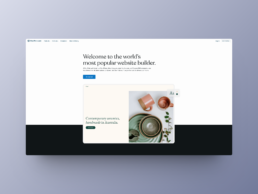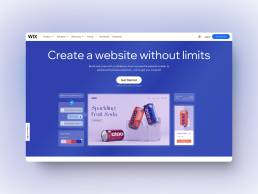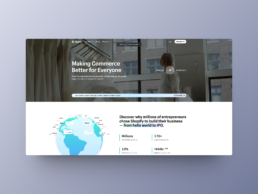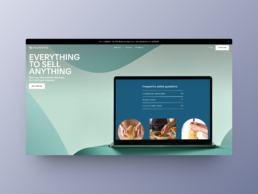As you start the journey to design your website it’s important to consider which platform you’re going to build on. If you asked me ten years ago, I would not have hesitated to say WordPress 90% of the time. Today, with so many great options available, it’s important to pick the best website builder for your small business.
Let’s explore five of the best builders for small businesses, learn how each best suits your goals, and the unique aspects that will be beneficial for specific use cases.
We’ll start with what is still one of the most popular platforms to date.
WordPress
WordPress is still a popular business website platform for a reason. It’s one of the most versatile website builders available. WordPress can support all types of websites, including business sites, eCommerce stores, blogs, e-learning, and more. It offers a user-friendly interface and a vast library of themes and plugins, allowing businesses to customize sites to meet your specific needs.
Its robust Content Management System (CMS) and Search Engine Optimization (SEO) integrations simplify website management for large teams. One of its biggest selling points for large companies is its security abilities and user access management. Many notable brands run on WordPress, like TechCrunch, Sony Music, Meta Newsroom, and Time Magazine.
Pros
- Versatility for business websites, eCommerce, and e-learning
- The vast library of themes and plugins
- Security capabilities
- User access management
Cons
- Monthly web hosting fees can get pricey, for high-traffic sites
- The user is responsible for executing routine updates
- No customer support

43% of the web is built on WordPress. More bloggers, small businesses, and Fortune 500 companies use WordPress than all other options combined.
Wix
Wix is a beginner-friendly website builder. Wix creators wanted to make a more accessible platform that allows people of all experience levels to use it. Its simple drag-and-drop interface makes it easy for businesses to create a visually appealing website without any coding knowledge. Like many of the website builders on this list, Wix offers a wide range of customizable template designs to choose from. It has a vast library of apps and widgets.
Beyond aesthetics, Wix also provides built-in SEO tools, eCommerce capabilities, and reliable hosting. Users purchase their website hosting through Wix, making it a great all-in-one solution.
Pros
- Drag-and-drop design
- The vast library of templates, apps, and widgets
- Built-in SEO tools
Cons
- The SEO capabilities are less robust than other website builders
- Monthly subscription plans can be pricey for video-heavy and high-transaction websites

Wix is for everyone and makes it possible to create a high-quality website without knowing how to code.
Shopify
Shopify is arguably the best website builder for eCommerce. Its entire focus is on serving those who manage online stores. Businesses that choose Shopify can use the platform to track inventory management, track orders, retarget customers with email marketing, and more.
The platform offers several customizable templates. On top of that, it also has excellent security features, seamless integration with third-party apps and websites, as well as reliable customer support. For businesses that prefer other platforms, you can still use Shopify as your cart or storefront.
Many notable brands rely on Shopify for their storefronts, such as Crate&Barrel, the Brooklyn Museum, GymShark, and Steve Madden.
Pros
- Dedicated eCommerce platform
- 24/7 customer support
- Built-in inventory management, order tracking, and seamless payment gateways
Cons
- Expensive monthly fee for large businesses and teams
- May require an advanced skill set for API use and advanced app features

Shopify is the #1 eCommerce platform for most businesses. You can start, Run, and grow your business with Shopify.
Squarespace
Squarespace is another great all-in-one website platform. It’s known for its stunning design capabilities, making it an ideal choice for small businesses, artists, and creative businesses. Squarespace has built-in eCommerce functionality, email marketing, and blogging. It also has impressive analytic tools to help you track and guide growth for your business.
Although not as easy to use as Wix, its user-friendly interface continues to improve. Many businesses that start with Squarespace stay with Squarespace.
Pros
- Includes business essentials, such as email marketing, calendar booking, eCommerce, and e-learning
- Built-in SEO tools
- Stunning design capabilities
Cons
- Less robust than WordPress, Shopify, or Joomla
- Updates to the latest software versions often require new website builds on those versions

Squarespace features modern and elegant pre-built website templates and drag-and-drop elements to create and modify them.
Joomla
Joomla is a powerful open-source CMS. While not as widely used as WordPress, Joomla is highly customizable and flexible. It offers a range of templates and extensions that enhance functionality and design.
Joomla is best suited for complex websites. Companies that need online communities, forums, and membership portals turn to this platform. It requires someone with advanced knowledge of web design and development to create and maintain sites.
Pros
- Open-source CMS
- Customizable and flexible
- Great online community, forums, and membership functionality
- Multilingual support
Cons
- Requires advanced coding and development skills
- Not user-friendly for everyday maintenance

Joomla is the second most popular content management system behind WordPress, powering around 3% of all the websites.
Honorable Mentions
All the platforms I’ve mentioned above are well-established and well-known in the industry. In 90% of cases, I would recommend these. However, there are some great platforms that have been around just as long but aren’t as well-known or only apply to certain use-cases. In the last month I’ve helped build sites using two platforms that deserve an honorable mention: Unbounce and Ceros.
Unbounce
Unbounce has been around since 2009. It is built with A/B testing in mind and, unsurprisingly, it excels at it. Its builder is great and makes it easy to clone and edit variations of the same page for testing their effectiveness. I found, however, that its use of styles through CSS was clunky and hard to make it work, which is a pretty serious shortcoming for me. I would recommend it only for people who are heavily interested in A/B testing and who either have a team of skilled professionals to manage it or want a long-term partnership with an independent person, like myself.
Ceros
Ceros is even older than Unbounce, a no-code, drag-and-drop builder with an emphasis on ease of use and animations. Their research shows that users respond better (aka, convert more) to subtle animations. So, the team at Ceros has built an excellent menu with all sorts of animations, interactions, hover states, etc. It’s a great platform if you’re looking to increase your visitor’s time on page and attention.
Choose the Right Website Builder for Your Business
It’s important to consider your specific requirements, technical expertise, and budget when choosing a website-building platform for your business. Each platform above has its own strengths and caters to different types of websites.
It can be hard to decide which is right for you. If you need help evaluating the platform or building your site, reach out to me. I have extensive experience with all five platforms and can offer technical and design guidance.
Borja Zamora
A Barcelona native but San Francisco based, Borja explores digital marketing and design through articles, images, and quotes.
Related Posts
December 9, 2024
10 Innovative Web Design Trends To Watch In 2025
Explore the top 10 web design trends for 2025, including AI personalization,…
July 23, 2024
Beyond Flat Design: The Rise of Neo-Brutalism and Textured Experiences
This year, I’ve seen a rise in Neo-Brutalism style design and textures. Find…
May 31, 2024
Sustainable Practices in Web Design for a Healthier Planet
Today's digital dependence means a higher environmental impact of our online…
December 15, 2023
10 Design Trends in 2024
Ask anyone and they’ll tell you the market is shifting. Most are probably…
Related Posts
December 9, 2024
10 Innovative Web Design Trends To Watch In 2025
Explore the top 10 web design trends for 2025, including AI personalization,…
July 23, 2024
Beyond Flat Design: The Rise of Neo-Brutalism and Textured Experiences
This year, I’ve seen a rise in Neo-Brutalism style design and textures. Find…
May 31, 2024
Sustainable Practices in Web Design for a Healthier Planet
Today's digital dependence means a higher environmental impact of our online…
December 15, 2023
10 Design Trends in 2024
Ask anyone and they’ll tell you the market is shifting. Most are probably…







